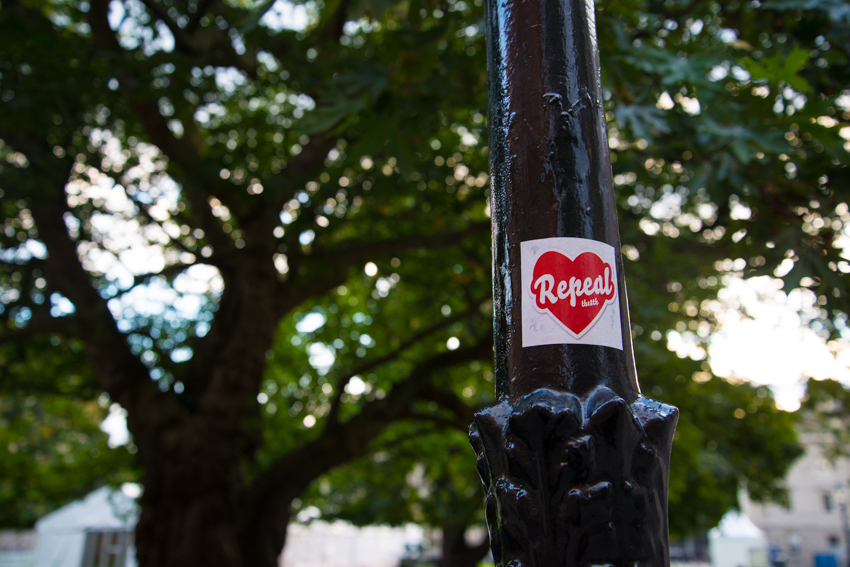In the last few months, the Irish public has become both energised and deeply divided over the long-awaited referendum on the eighth amendment. The debate, heralded by many as an example of Ireland’s ever-widening “generational gap”, is only part of the picture.
As a pro-choice advocate new to the activist scene in Dublin, I attended the March for Choice, where I was baffled, and quite frankly terrified, by the naïve optimism of the largely middle-class youth taking part. I don’t doubt their good intentions, but I have met people who genuinely believe this referendum is already over, and now it is smooth sailing, with freedom to wear repeal jumpers and spray paint the word ‘repeal’ on Dublin curbs with no need for nuance.
The repeal movement is making the same mistake that the remain movement in Britain also made – ignoring demographics, and preaching to the choir.
The repeal movement is making the same mistake that the remain movement in Britain also made – ignoring demographics, and preaching to the choir.
Irish demographics is a matter seemingly forgotten by many Dubliners, and it is simple mathematics. “Culchies” are the majority. In the 1983 referendum, the only constituencies that voted for abortion rights were in Dublin. The generation that voted in 1983 are still alive, and they are by and large pro-life. They are mostly from agricultural backgrounds and do not look at the Instagram feeds of young people wearing repeal jumpers.
A march for choice is an engaging idea, but it is interesting that the march was not organised at grassroots, local level across the country in various towns and communities. This has striking similarities to the campaign in the UK to remain in the EU, where remain politicians stuck to areas they knew the remain campaign had popular support. Yet all the promises of the “Northern Powerhouse”, powered by EU and international investment, could stop English Northerners voting to leave the EU primarily for older, nationalist reasons.
This is why the argument of “everywhere else in Europe has abortion” falls on deaf ears in the Irish countryside. Older generations have no interest in replicating the “baby killing” of the continent. It is a paradigm that means nothing, because they are not even on it. Commodification of a word on a jumper is not a counterargument to people who think women’s reproductive rights are murder.
Very often, people who are pro-life see the issue as moral, rather than political. Many view the eighth amendment as codifying in the constitution a guarantee against liberal politicians removing religious influence from the state entirely. In a decade of constant liberal leaps, from same-sex marriage to Leo Varadkar becoming taoiseach, they see themselves as a generation that is consistently having its morals and values transgressed by an increasingly Americanised youth. This feeling of isolation and neglect from their governments is a recurring theme among many right-wing movements in Europe, from the success of Brexit in England to the popularity of Marine Le Pen in France. It was the inability of the remain campaign to address the grievances of this demographic of people that was its undoing.
This feeling of isolation and neglect from their governments is a recurring theme among many right-wing movements in Europe, from the success of Brexit in England to the popularity of Marine Le Pen in France.
This is not to say the countryside and parochial Ireland has been stagnant over the last few decades, and that the marriage referendum passed comfortably in both Dublin and beyond the pale. However, abortion is a much more contentious issue than the marriage of two consenting adults. The pro-life institutes are heavily funded, both by national conservative figures and international conservative lobbyists, and the repeal movement is going to have to act twice as hard on the ground in order to even compete.
To add insult to injury, the pro-life movement doesn’t even need the money. Unlike the leave campaign during the Brexit referendum, pro-lifers do not need any outlandish claims such as “£350 million a week to the NHS” to vote the way they want to vote. The fulfilment of the moral value of “saving babies” is the only funding they need.
The UK remain movement relied too heavily on its own liberal insight of the virtues of the EU, and this is where the Irish repeal movement must be careful not to falter. The campaign, to its credit, has shown that time and time again, it is not afraid to express its views with fiery determination and drive. But it is once the movement realises the value of taking on the streets of Letterkenny, rather than the echo chambers of south Dublin, that it will move closer to the victory that it is fighting for.







